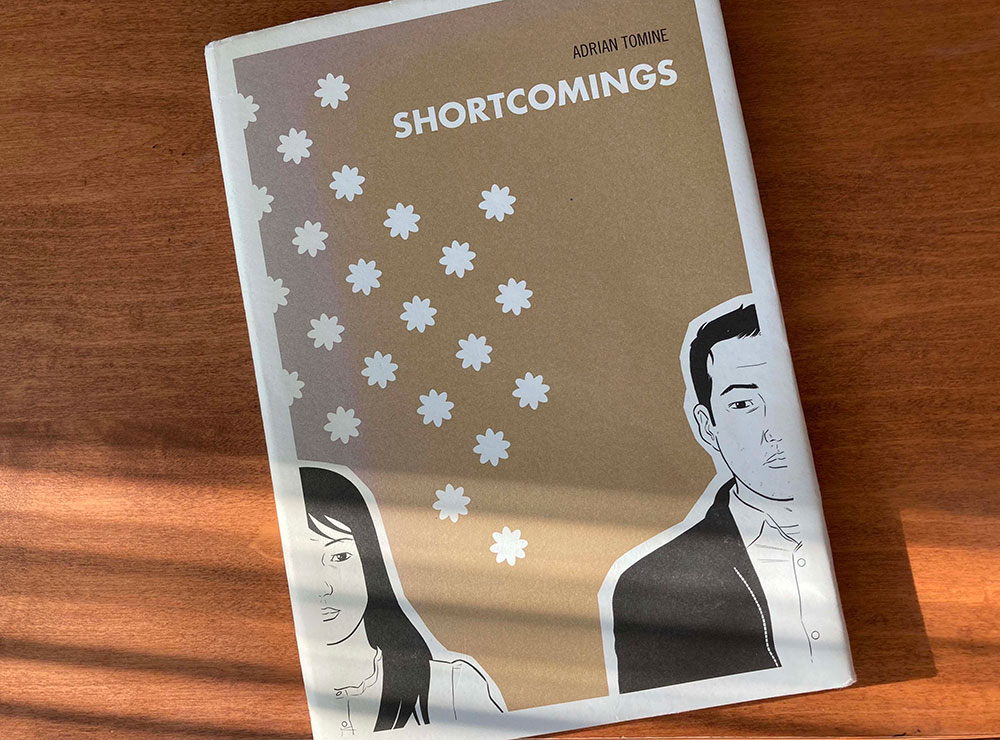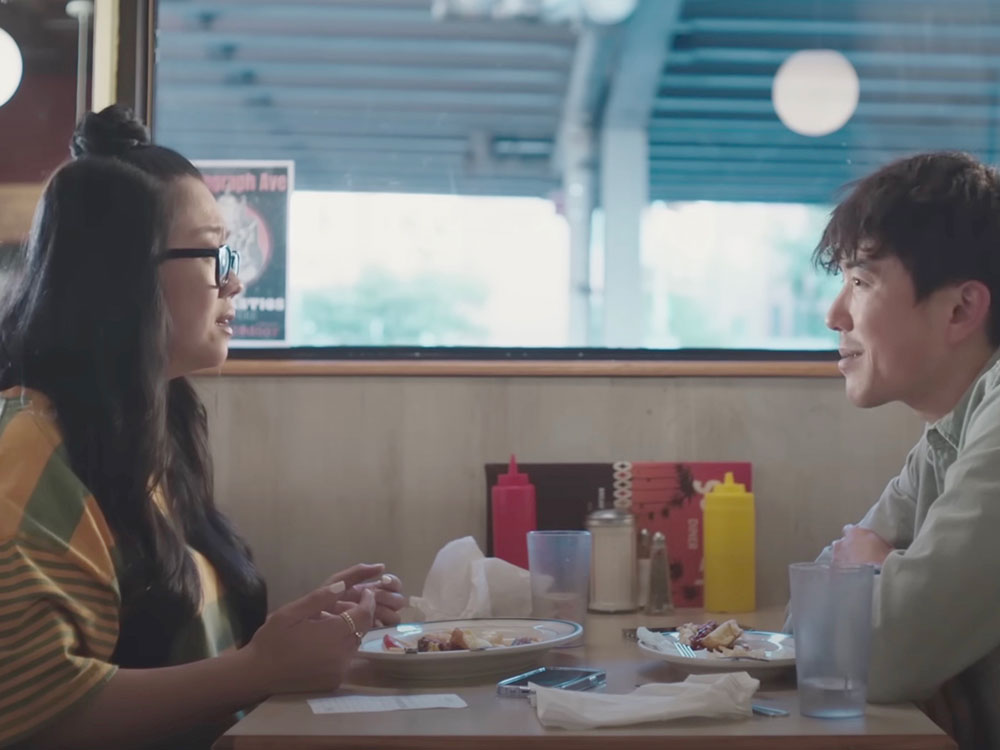I’ve always wondered why graphic novels aren’t more frequently adapted into film. The very best of the genre offer stories and experiences that are dazzling in their originality, idiosyncrasy and execution. Plus, the narratives are essentially already worked out — character, dialogue and settings all storyboarded to perfection.
Shortcomings provides a few reasons why this might be. The anticipated, buzzy film based on New York City graphic novelist Adrian Tomine’s book of the same name premiered at the Sundance Film Festival this year and is the directorial debut of noted Korean-American actor Randall Park (Fresh off the Boat, Always Be My Maybe). It arrives in theatres Aug. 4.
Tomine’s book about Ben Tanaka, his long-time girlfriend Miko Hayashi and their romantic tribulations was published by Montreal’s Drawn & Quarterly in 2007. In spare lines and crisp black and white images, the book had a specificity of time and place, as well as a razored wit that cuts through any sentimental stuff with clarity and precision.
On paper, it all works. At the time of its publication, the story of Ben, Miko and Ben’s best friend Alice was something of a revelation, a fully realized portrait of a group of people struggling with the onset of adulthood, romantic failures, professional ennui and a wee bit o’ sexual dysfunction. On film, it’s another matter. The story has all the makings of an indie darling, but it fails to come alive. Is it a failure in translation from one medium to another, or something more fundamental?
Ben, played by Justin H. Min, is a cranky would-be auteur who fills his days with pining for white women and wanking up a storm to the same. His job at an arthouse theatre that shows French New Wave fare to a dwindling clientele is thoroughly unchallenging, but at least lends some proximity to filmmaking. Meanwhile, his girlfriend Miko, played by Ally Maki, has had it up to the eyeballs with Ben’s constant complaining, lack of ambition and overall unpleasantness.
Ben’s lack of initiative is viewed by himself as a repudiation of all things mainstream, but in truth, he’s simply a bit of a dick. A fact duly acknowledged by his best friend Alice, played by Sherry Cola, who is herself something of a dick. Alice regularly beds and ghosts women, but when she “kicks a woman in the pussy” after an argument she gets bounced out of grad school. Despite being a bit of a jerk, Alice is at least entertaining. The same cannot be said of Ben. He’s insufferable, and not even in a cute rom-com way: just plain ugh.
Following a screening of a thinly disguised version of Crazy Rich Asians at the film festival where Miko works, the couple fall out about whether the film represents a pandering to the dominant, capitalist paradigm (Ben’s position) or whether it will open the doors to future projects that feature Asian actors and filmmakers (Miko’s take). The funny thing is that they’re both kind of right.
Which also implicates Shortcomings itself, in a strange way. It’s the product of an extensive Asian-American reckoning in film and media, played out by both Tomine, the author whose book inspired the movie, and Park, the film’s director. Before he took the director’s chair for the first time in Shortcomings, Park was working steadily as an actor for years, grinding up the rungs of silly sidekick roles towards more substantial work in breakout comedies that represented a new horizon for Asian-Americans in Hollywood. So, there is a personal element in the film, tied to Park’s own experience of being marginalized in mainstream film. He aims for the fences, but it’s more of a foul ball than a home run.
I wish it were different.

The actors do what they can. Is it enough?
The narrative thrust kicks in when Miko applies for an internship with a film collective in New York City. Her departure frees up Ben to indulge in his fantasy of sex with a white girl. An unsuccessful attempt to seduce a fellow workmate (Tavi Gevinson) is suitably cringey. But it gets worse when he’s actually successful at attracting the attention of a woman. At a party, Ben meets Sasha, a bisexual woman (Debby Ryan) who is on a break from her own relationship.
Ben’s romantic woes take up the bulk of the plot, and it’s hard to really care about what happens or doesn’t. It’s clear from the outset that Miko is better off without this oversized man-child who has little interest in anything other than watching old films and pretending that he might eventually end up being the Bay Area’s answer to new wave auteur Éric Rohmer.
The actors do what they can with the material. To be fair, as best friends Ben and Alice have an easy rapport that makes for some amusing moments. But spare a moment and some pity for poor Miko, who is so ill-served by the narrative that she comes across as barely a character at all. The movie sends her off across the country almost immediately, where she stays until the final romantic confrontation. She’s less of a person and more of a plot point.
Where’s the love?
Despite the charm of the source material and the support of Tomine as a writer on the film, what ought to be an entertaining and incisive look at romantic failure just doesn’t work.
Rereading some of Tomine’s original graphic novel, the difference between the drawn image and the cinematic equivalent might explain some of the limpness on offer. There is a particularity in Tomine’s drawings: black and white, yet filled with nuance and a level of originality that somehow gets flattened into sitcom sameness in the film, despite the charm of the actors involved.
The scene where Ben agrees to pose as Alice’s boyfriend because she hasn’t come out to her religious parents is a case in point. In the graphic novel, the scene takes a place in a car, the friends engaged in throwaway exchanges, both blunt and funny, that only comes from long familiarity. Their conversation encompasses not only the intricacies of parent/child relationships, but same-sex attraction, as well as the complicated history of Japanese and Korean people. It’s complicated and yet lightly offered.
The cinematic equivalent contains much of the same dialogue, but is played much more broadly. The dynamics between the different parties (parents, elderly grandfather) are present in archly comic fashion. In this way, the interpersonal stuff feels strangely less personal and more generic.
There is thorny stuff in the narrative. Namely Ben’s fetishistic weirdness around sex, his unresolved issues with race, money and ambition. It’s hard not to be on the women’s side as he flails about, looking for both absolution and acceptance.
As Sasha, the bisexual woman he uses for sex quite rightly says, don’t blame this on capitalism, society or even race, “This really is just about you.” She’s right. Like most humans, Ben is largely the source of all his own problems.
So, the film doesn’t work in quite the way as the original source material. Is there anything more significant that needs to be said? Well, just that romance isn’t what it used to be. I’m trying to recall a recent film about the human quest for love that was actually engaging, not thin gruel, but rich, thick and enrapturing. In all honesty, I don’t remember the last time a film presented a love story where I genuinely cared that the two people in question managed to find each other and make a go of it.
Meanwhile in graphic novels, stories as wondrous, idiosyncratic and deliriously enjoyable just keep coming, a cornucopia of great stuff. Camille Jourdy’s Juliette captures all of the complexities of love: the good, the bad, the effervescent heady stuff, that is gossamer in its fleeting loveliness and all the more precious for being so. So, too, is Caldecott Medal-winning authors Jillian Tamaki and Mariko Tamaki’s upcoming release Roaming that charts the misadventures of a trio of young people on a trip to New York. The storytelling is ample, thoughtful and burnished to sweet sheen by a bounty of carefully observed details. But underneath all of that, there is truth, the kind that you can smell, as distinctive and sharp as newly cut grass.
I will say easily one of the most romantic scenes in recent memory has nothing really to do with romance at all. In the second season of The Bear, the scene that takes place underneath a restaurant table both destroyed and exulted me. Astounding storytelling is still happening out there.
Great art can sometimes feel like a lightning strike, but it takes time, care and something unexpected to vault it into the territory of singular and wonderful. Sometimes, it takes a long time to get better at making things, be they movies or pasta.
But at the heart of it, I think there is something about the drawn image that can’t be replicated in any other form.
There is a kind of truth that stems out of the body, the physical act of putting pen to paper that opens up a pathway to the universal and the individual, all on the same page.
‘Shortcomings’ arrives in theatres Aug. 4. ![]()

















Tyee Commenting Guidelines
Comments that violate guidelines risk being deleted, and violations may result in a temporary or permanent user ban. Maintain the spirit of good conversation to stay in the discussion and be patient with moderators. Comments are reviewed regularly but not in real time.
Do:
Do not: